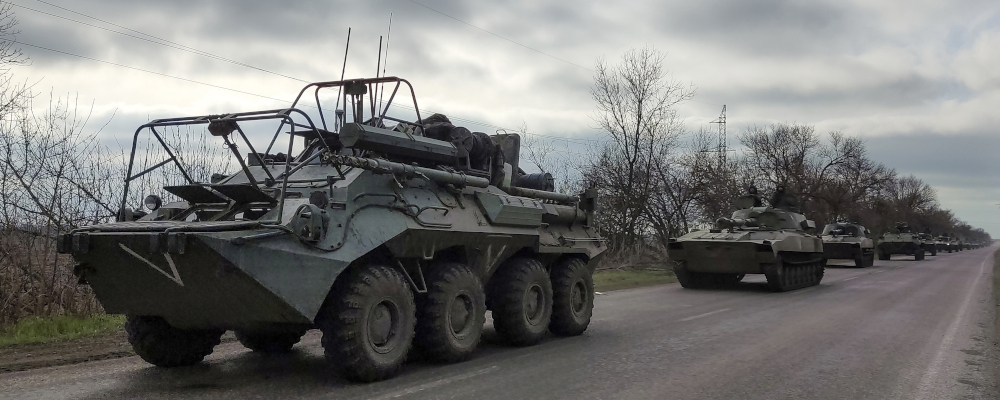When the New York Times ran a feature encouraging its writers to admit things they got wrong, we were equally intrigued and annoyed. What a great idea — why didn’t we think of that?! That’s exactly the spirit we want to encourage at The Hub. We know we won’t be right about everything, but we want to admit it when we get something wrong and we want to figure out why we were off base. So, this week, we’ll be borrowing the Times’ idea and running essays from our writers and staff about the things we got wrong. Please, enjoy our blunders.
One of the great things about being an editor, rather than a writer, is that most of your mistakes happen behind closed doors. Only our most diehard readers would ever notice if we were a little slow to cover a big story, or if we didn’t give it the priority or the seriousness it deserved.
And lucky for me, even that didn’t happen when Russia invaded Ukraine.
The Hub was actually one of the earliest voices warning about the implications of the Russian build-up on the Ukrainian border, although I didn’t have much to do with it. Our defence expert Joe Varner pitched us a piece in early November warning about an impending invasion and it was hard to dispute the facts on the ground as Joe laid them out.
Still, I didn’t take it seriously. And I know why.
I was born in 1983, which means the 9/11 terrorist attacks happened in the middle of my second week of university. I was about to turn 20 years old“To understand the man you have to know what was happening in the world when he was twenty.” – Napoleon Bonaparte when the United States brought regime change to Iraq in 2003 and my political worldview developed in response to what seemed to me like an insane adventure.
It was a visceral reaction, rather than anything borne of ideology or my barely-formed worldview.
Ten years later, I found the philosophical home for my views by trying to imagine what the temperamentally conservative thinkers Edmund Burke and Michael Oakeshott would think of “nation-building.”
I wrote: “If the conservative Edmund Burke recoiled at France trying to supplant its entire societal infrastructure through revolution, imagine how he would have reacted to a foreign power literally trying to build another nation from the ground up.”
Obviously, the Iraq War turned out to be a disaster and, because I had spent my twenties reading just about everything that was written about the war, I internalized and over-learned the lesson. It’s hard to read books like Fiasco, by Tom Ricks, and The Forever War, by Dexter Filkins, without coming away with a deeply skeptical view of anyone warning of some faraway threat to our liberty or promoting an easy way to bring freedom to oppressed people.
And so, even though I was reading Joe’s repeated warnings about the potential scale of Russian aggression, I was inclined to agree with President Joe Biden that it seemed more likely to be a “minor incursion” and I didn’t see that as an existential threat to the rules-based international order.
Bizarrely, I had also just finished reading The Rise and Fall of the Third Reich by William L. Shirer, which has a detailed chapter on Neville Chamberlain’s misadventures trying to achieve peace in his time. Although he doesn’t quite deserve the ire he attracts, reading about Chamberlain these days is like watching a horror movie, knowing a particularly dumb character is about to walk into the murderer’s clutches. Don’t go into that negotiating room, Neville!
Even with Chamberlain fresh in my mind, I still doubted Vladimir Putin’s malevolence.
So at the end of February, when Russian spearheads pierced Ukrainian territory and it became clear that a full-scale invasion was underway, I felt sick to my stomach. Many thousands of Ukrainian civilians were sure to die, refugees would be streaming across borders and the world would be drawn into this conflict, one way or another.
I had underestimated Putin’s maliciousness and, even worse, I had repeated the worst mistake of the people who had supported the Iraq War. I hadn’t understood the history of the region and I had assumed that everyone involved was using the same rational cost-benefit analysis that I was.
Almost everything about the invasion surprised me, even the Russian difficulties that have ground the war into a stalemate.
It will frustrate people like Joe Varner, who were so clearly right when I was wrong, but I won’t say that I’ve changed my entire outlook based on this mistake. Burke counseled prudence and humility to statesmen and those lessons still dominate my thinking, especially in foreign policy.
Even if we are now clear-eyed about Putin and his aggression, it doesn’t necessarily make the solution easy or simple.
The first task of leadership is correctly identifying problems. The second task is not making those problems worse when we try to solve them. I’m still sure that we haven’t mastered the second task when it comes to foreign policy, despite my own shortcomings with the first one.
Recommended for You

Laura David: Red pill, blue pill: Google has made its opening salvo in the AI-news war. What’s Canadian media’s next move?

The Notebook by Theo Argitis: Mark Carney’s first major tests

The Weekly Wrap: Trudeau left Canada in terrible fiscal shape—and now Carney’s on clean-up duty

Ben Woodfinden: Lament for an ‘elbows up’ nation



